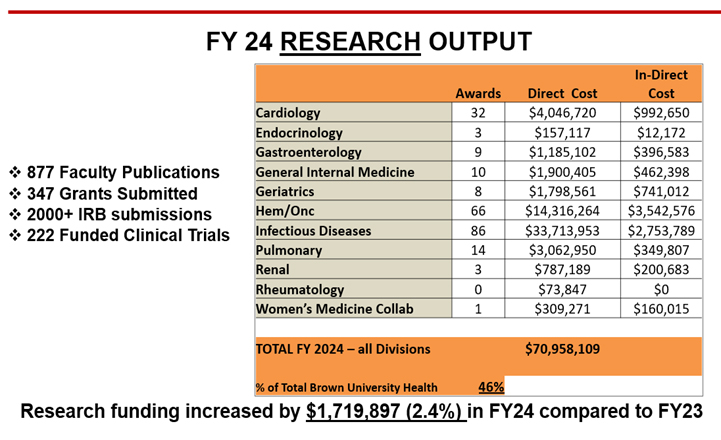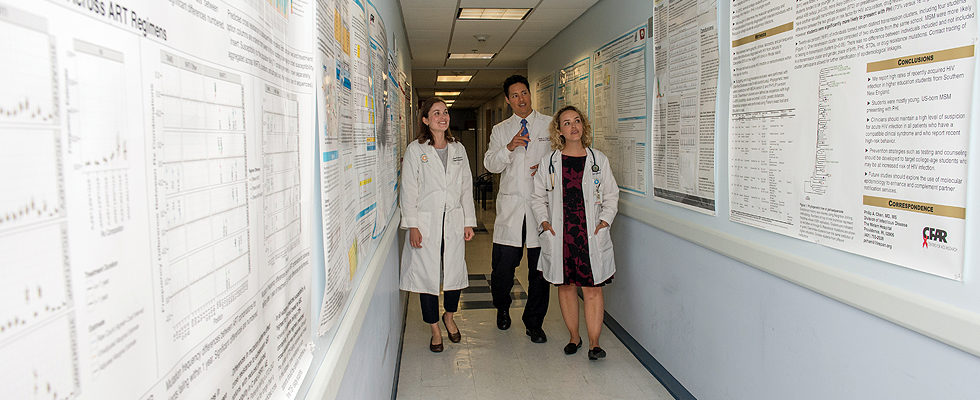Brown University has long been regarded as a leader in all aspects of health care and teaching, including research. The Department of Medicine continues to expand its base of externally funded research support with total funding in FY24 of $70,958,109 representing 46% of all external research funding at Brown University Health, its healthcare affiliate. The major funding sources are the National Institutes of Health followed by the Centers for Disease Control and Prevention, Substance Abuse and Mental Health Services Administration, the Department of Defense and the Department of Veterans Affairs. Clinical research is an extremely important component of our educational and scholarly mission and in FY24, faculty submitted more than 2,000 IRB applications and managed 222 clinical trials.
The major research laboratories, animal facilities and centers at Brown are located among all the hospital affiliates. The laboratories are highlighted by the Galletti Research Building, a 60,000+ square foot research facility, home to the Liver Research Center as well as the 90,000 square foot (lab only) Coro research facility which houses the Genomics and Proteomics Center, Cardiovascular Research Center, animal facilities and Hematology/Oncology labs.
Both basic and clinical research are well represented within the Department. The Division of Infectious Diseases is a successful program with >$30 million of external research funding, >120 scientific publications/year, a large clinical presence with multiple inpatient services, a large outpatient presence with >22,000 patient visits per year and is serving as a secondary site and a significant educational site for students and trainees across Brown as well as the various health systems. Notably, there is a strong balance between general Infectious disease and HIV research and clinical work. The Division of Hematology and Oncology has approximately 80 active clinical studies including studies from the National Cancer Institute cooperative groups, investigator-initiated studies, and biotech industry. The division enrolled approximately 350 patients on cancer treatment trials including approximately 175 patients on early phase trials including first-in-human trials. The division has over $10 million in external funding. The Division of Geriatrics and Palliative Medicine has a significant presence at Brown University Health, VAMC and Brown SPH. The VA’s Center on Innovation and Long-Term Services and Supports (COIN, James Rudolph, PI) provides critical infrastructure for health services research training for junior investigators. These activities produced over 100 peer reviewed publications last year, including from each of its clinical fellows and trainees across divisions (Infectious Disease), departments (Emergency Medicine and Cardiology) and Schools at Brown (Alpert Medical School, School of Engineering and School of Public Health). The work informs policy at the Central Office at the VA, CDC and the Centers for Medicare and Medicaid Services.
The Department of Medicine conducts a significant amount of research related to health disparities and community engagement and outreach. Our major NIH funded research Centers include the Center for AIDS Research (CFAR; PI: Dr. Susan Cu-Uvin, MD), Advance-Clinical and Translational Research (PI: Sharon Rounds, MD) and the COBRE for Opioids and Overdose (PI: Dr. Josiah Rich, MD). Dr Jody Rich’s team is focused on addressing the overlapping epidemics of substance use, overdose, infections, including HIV and HCV, mass incarceration and racial health and economic disparities. His teams go into the community and the correctional setting and work directly with people most at risk including those with addiction, mental illness, active injection drug use, HIV/AIDS and other challenges. Dr. Susan Ramsey’s work focuses on the intersection of substance use and HIV prevention, including among incarcerated individuals.


